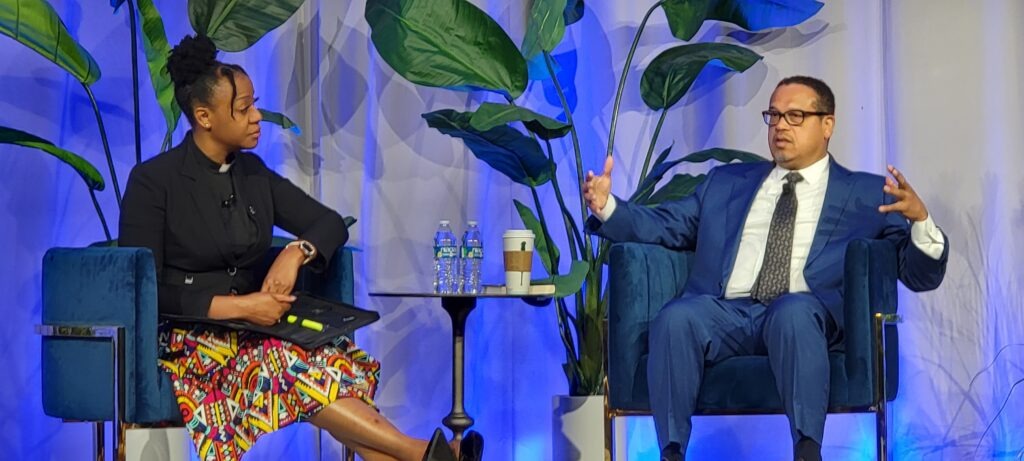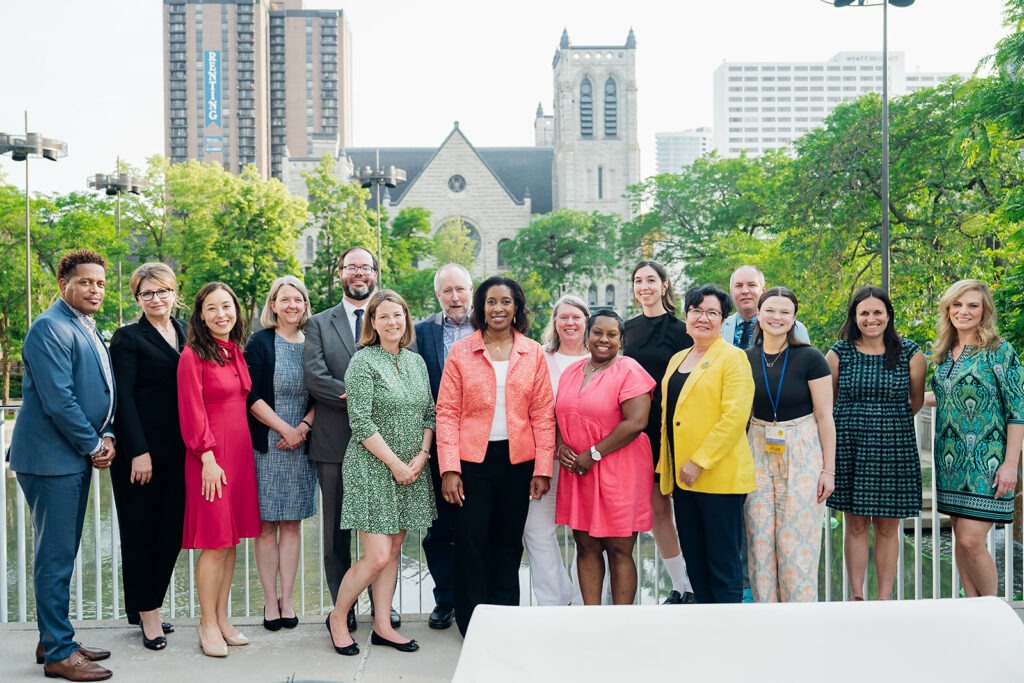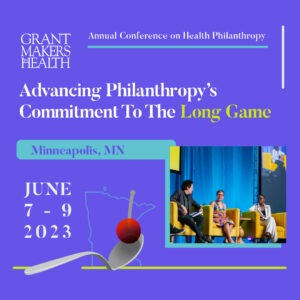Reporting from the 2023 Annual Conference on Health Philanthropy
“This isn’t daily or weekly work. This is lifetime work.”
Meera Chary, Partner, Head of the Leadership Accelerator, The Bridgespan Group
Friday may have marked the close of the 2023 GIH Annual Conference on Health Philanthropy, but it was just the beginning of a renewed commitment to the long game. From deep laughs at the wellness activity to deeper discussions during breakout sessions, the last day left attendees with takeaways to catalyze conversations with colleagues and communities.


Spotlight on Plenaries
“How do we convert the energy that we saw so richly displayed in the year after George Floyd’s murder into meaningful change?” Attorney General Keith Ellison, the first African American and first Muslim American to win state office in Minnesota, opened the plenary titled, George Floyd: A Catalyst for Advancing Racial Equity with this guiding question for all. In discussion with Minister JaNaé Bates, the Communications Director of ISAIAH, Ellison delivered an account of Minneapolis’ change and growth in the aftermath of George Floyd. The state and the nation witnessed an impassioned call from citizens to confront a multi-century problem.
Ellison, Minnesota, and the whole country learned that convictions do not equal justice. Engaged citizens were demanding true accountability, particularly administrative accountability. Ellison was positively surprised by community accountability in practice, from the burgeoning mutual aid groups in Minneapolis to the citizen activism to de-escalate conflict within neighborhoods. This dedication to common safety resulted in a drop in police brutality incidents and confirmed for Ellison that policing indeed impacts public health. To commit to long-term safety and community care, he suggested funders support youth programs, housing, civic engagement, and mental health care.
For Ellison, “We’ve got to rebuild the idea that we are all connected. It will make us safer and healthier.” As the final day of the conference continued, community care and resilience became the topic of the day and was central to the closing plenary about how funders can support nonprofits in this work. In the afternoon, President and CEO Cara V. James walked onto the stage once more (to a Prince song, of course) to moderate the plenary Committing to the Long Game: Strategies for Building Community Capacity.
Meera Chary, Partner, Head of the Leadership Accelerator at The Bridgespan Group, started with a shared definition of capacity-building. Capacity-building is any support that promotes a nonprofit’s long-term sustainability and effectiveness, including everything from investments in infrastructure to opportunities for rest and healing. However, she also noted that capacity-building historically has been a “band-aid” short-term approach, and not easily accessible to BIPOC nonprofits and leaders. She highlighted that funders need to address barriers, especially ones they have created and systemized, in addition to providing capacity-building resources. More importantly, as we heard throughout the conference, funders must ask nonprofits what they need and let them decide where to direct capacity-building dollars.
Katherine Wu Brady, Chief Operating Officer at Catchafire, built on this directive to ask what nonprofits need to better serve their communities. She asked what the audience thought nonprofits’ top funding request was in 2022. While many attendees were largely split between organizational strategy and fundraising, Wu Brady revealed the actual top requested need was website development. This indicates that organizations may not have the tools to properly communicate their work and thus are not reaching the constituents that they should. As a funder, it is important to think about the “constellation of support” that is needed, everything from communications to skills-based volunteers, funding to resources.
The day’s plenaries underscored that funders must think beyond the grant and regularly connect with those who know best: the community. As Ellison shared, we must “refund the community.” To do that work, we need to listen, ask questions about needs today and tomorrow, and then incorporate this knowledge into the long game. Whether you’re newly committed to the long game or found your long game strengthened and renewed at the conference, GIH looks forward to supporting you on the path with more opportunities to learn, connect, and grow.
Breakout Spotlight: Abortion Care is Health Care: The Role of Health Funders in this Moment
What is the role of health funders in a post-Dobbs world? How can philanthropy move dollars quickly to protect reproductive health care as part of our work to advance health and well-being for everyone? Millions of women and birthing people no longer have access to reproductive care. The panelists in the breakout titled Abortion Care is Health Care: The Role of Health Funders in this Moment emphasized that funders have untapped power to connect the dots between abortion care and health care. For years, funders focused on national organizations largely concerned with maintaining Roe, not necessarily funding abortion care. Panelists discussed how abortion care happens at the state and local level, at organizations largely run by Black and Brown people, and the lack of funding on the ground is a key reason the U.S. has yet to see a shift to abortion as health care.
A panelist from Robert Wood Johnson Foundation (RWJF) shared that they did not always fund abortion care. But organizations are not static. They can evolve. When RWJF acknowledged abortion is health care, the organization not only did deep work to ensure they came into the space responsibly, but they also acknowledged the harm they perpetuated by not supporting abortion care explicitly and directly in the past. Panelists agreed that funders should not let the past stop you from “making the road as you walk.”
Before the session closed, each panelist suggested concrete steps for funders to take today to shift the view that abortion care is health care:
- Say the word “abortion.”
- Fund local.
- Connect with other funders and networks.
- Create the infrastructure to move funds quickly.
- Fund intermediaries who are supporting this work on the ground.
- Connect the dots with what you already fund.
This session was designed by The Libra Foundation.
On the Ground
“I heard a clear theme in conference sessions to networking conversations: We must be intentional about building relationships. Coming out of this year’s annual conference, I plan on being more intentional with my time to develop meaningful relationships.”
– Kate Treanor, Senior Program Director at Grantmakers In Health
Fun fact: Research has linked laughter (and the GIH Laugher Coach wellness break!) with boosts in immune function, pain tolerance, and cardiovascular health.
Reporting from the 2023 Annual Conference on Health Philanthropy

2024 #GIH Annual Conference will be in in Portland, Oregon!
June 2024

